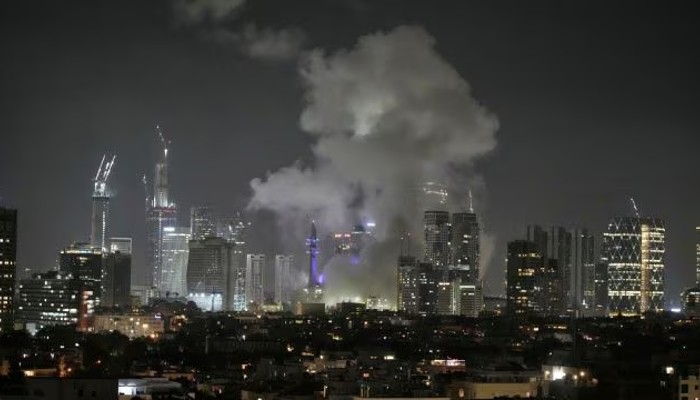India and Iran Discuss Chabahar Port Amid Regional Tensions

India’s National Security Advisor Ajit Doval held a phone call with his Iranian counterpart, Ali Akbar Ahmadian, to discuss regional developments and reaffirm commitment to joint infrastructure projects, including the Chabahar port.
India’s NSA Ajit Doval and Iran’s Ali Akbar Ahmadian discussed expanding cooperation on the Chabahar port and regional stability amid India-Pakistan tensions.
India’s National Security Advisor Ajit Doval and Iran’s Secretary of the Supreme National Security Council Ali Akbar Ahmadian held talks on Sunday to review regional developments and bilateral cooperation. The call comes at a time of heightened military tension between India and Pakistan.
According to an official statement from Tehran, the two sides discussed ways to advance strategic projects such as the Chabahar port and the International North-South Transport Corridor (INSTC), a key regional trade initiative.
“During the call, Doval emphasised Iran’s constructive role in the region and expressed India’s interest in expanding bilateral cooperation — particularly in the development of Chabahar Port and the International North-South Transport Corridor,” the Iranian readout stated.
The conversation also included a review of current security challenges in the region. Though not officially confirmed by New Delhi, it is understood that the recent India-Pakistan border tensions were also discussed during the call.
The Iranian official, Ali Akbar Ahmadian, underscored the historical depth of Iran-India relations and called for the swift implementation of strategic agreements. “Iran and India, as two ancient civilisations, share deep-rooted ties and vast potential for political and economic collaboration,” he said, according to the statement.
Ahmadian further noted that stronger cooperation between the two countries would contribute to regional peace and stability.
Ajit Doval, in turn, thanked the Iranian government for its continued support and assistance in various areas of bilateral engagement.
Chabahar Port and INSTC
Located in Iran’s Sistan-Balochistan province along the Gulf of Oman, the Chabahar port project is a cornerstone of India-Iran economic cooperation. The port serves as a vital maritime outlet for landlocked Afghanistan and Central Asia, bypassing Pakistan.
The development of Chabahar is also a strategic element of the International North-South Transport Corridor — a 7,200-kilometre multi-modal network aimed at improving freight connectivity between India, Iran, Afghanistan, Central Asia, Russia and Europe.
India has invested significantly in Chabahar’s infrastructure, including the construction and operation of terminals and cargo facilities. The port is seen as a counterbalance to Pakistan’s Gwadar port, which is being developed with Chinese support under the China-Pakistan Economic Corridor (CPEC).
The INSTC, which was first proposed in 2000, seeks to reduce transit time and costs in moving goods from India to Europe. It involves a combination of ship, rail, and road transport, with Chabahar playing a pivotal role in maritime logistics.
Context: Strategic Significance
The timing of the high-level call highlights the geopolitical importance of Chabahar and Iran’s broader role in regional connectivity. Amid escalating tensions with Pakistan and ongoing strategic competition in the Indian Ocean region, India’s deepening ties with Iran provide an alternative route for trade and transit.
Experts say the Chabahar port and INSTC are part of New Delhi’s broader strategy to secure energy routes and economic corridors that are not vulnerable to disruptions in traditional transit paths.
Iran, for its part, views cooperation with India as a way to expand its economic outreach and bypass sanctions-related bottlenecks in global trade.
While India continues to navigate a complex web of regional alliances — including ties with the United States, Russia, and Gulf countries — its sustained engagement with Iran underscores the enduring importance of infrastructure diplomacy in South and Central Asia.

Israel-Iran Conflict Escalates: Missiles Exchanged Amidst Mossad-Led Strikes
Tensions soar as Israel and Iran exchange missile strikes. Israel targets nuclear sites, Iran retaliates with ballistic missile barrage, raising war fears.
| 2025-06-14

Iran Summons UK Diplomat Over Arrests of Nationals in Terror Probes
Iran protests UK arrests of its nationals over terror charges, calling the move baseless and politically motivated. Three Iranians face national security charges.
| 2025-05-19

Qatar Airways Profit Surges 28% to $2.1 Billion on Global Expansion
Qatar Airways reports a record $2.1 billion profit, driven by international investments and a landmark aircraft and engine deal with Boeing and GE Aerospace.
| 2025-05-19

Haj Flights Resume Between Saudi Arabia and Iran After Eight-Year Pause
Flynas restarts haj flights from Iran for the first time since 2015, signalling improved Saudi-Iran relations after a Chinese-brokered deal in 2023.
| 2025-05-19

Iran and Azerbaijan Launch Joint Military Drill in Nagorno-Karabakh
Iran's Revolutionary Guard and Azerbaijani special forces begin Aras-2025 military drill in Nagorno-Karabakh to boost regional border security.
| 2025-05-18




